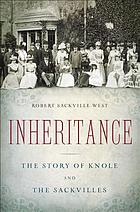Inheritance is a quick read, each chapter chronicling the tenants of Knole from Thomas Sackville, 1st Earl of Dorset (who lived in Knole from 1604 to his death in 1608) to the National Trust, who bought the home from the family in 1946. Robert Sackville-West, the current custodian of the family's interest in the home -- and resident, along with his family, in the private quarters on the estate -- draws on substantial family papers and documents of record as well as family memory to provide a light-hearted romp through history. Some of the best bits of the story are told in the words of the author's ancestors who were thoughtful enough to leave behind diaries, daybooks, ledgers, and correspondence for future generations. Robert does not seem particularly anxious about protecting the family propriety in sharing anecdotes -- if anything, he seems to enjoy highlighting the angst and drama of Knole's inhabitants. In the chapter on Richard Sackville, 5th Earl of Dorset, he writes
There is ... a strange agreement countersigned by the countess on 30 July 1674 -- although, beside her signature, she has crossed out the words "by my husband's Command." The document is titled an "Engagement from my Wife to me upon the dismissing of a servant of mine named Thomas Jones at her desire," and relates how a certain Lady Charnoche had (or so Frances [the countess] had been "credibly informed") wagered that Frances would die within the year. When a new servant previously employed by Lady Charnoche arrived at Knole, Frances was terrified that he would 'in all lyklyhood have some Instructions" to poison or shoot her "upon this surmise." In return for her husband dismissing this servant, Frances promised that she would never trouble him with such a request in the future. But his conditions went further: she would 'never molestt disquiet or disturbe him again in this or in any other thing namely in medling with any business of his"; she would not hinder him from going or being where and "in whatt Company he pleases, without my running clamouring or hunting after him"; and she would not stir from Knole without his consent. (74)Particularly charming are the documents which chronicle the family's sexual history in surprisingly frank terms. In 1754, for example, Lionel Sackville (1st Lord of Dorset) received a letter from his good friend Robert Cunningham congratulating him on the event of his marriage. "Before you receive this Letter I do suppose your Nuptials are consummated ... We [Cunningham and his wife] can both easily imagine how you will be employed next Tuesday night, and shall certainly do what we can to imitate your example. I shall persuade Betty that what you have in size I have in vigour, that our wives, when they meet, may not dispute who are best served" (121). We can only hope a good time was had by all!
As with Victoria Sackville-West's diaries, written during her early marriage, in which she provides "a sexual tour of the house, of where and how often the young couple made love" (181). Including, Robert conveys, such sites as the lawn, under a big tree, on a sofa in Victoria's sitting room, in the library, in bed, in the bath, and so forth -- up to four times a day such as on the 18th of September when Victoria notes "Stallion" approvingly.
I don't really have more to say about this title, although it does provide (reading somewhat between the lines, although Robert does note the inequalities of gender when it comes to inheritance) a peep into a number of unhappy domestic scenes, suggesting far beyond the scope of the book the tensions of social expectations on private lives and sexual inclinations.

No comments:
Post a Comment